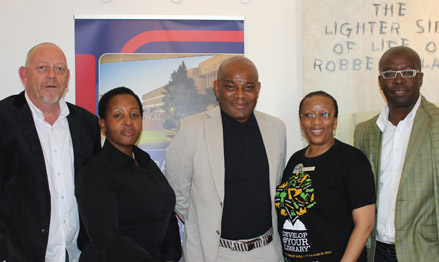|
 |
Revelling in the lighter side of life on Robben Island, were from left: Paddy Harper, Gugu Kunene, Peter-Paul Ngwenya, Betsy Eister, Director of the UFS Library and Information Services, and Fred Khumalo.
Photo: Jerry Mokoroane
16 September 2013 |
In recognition of National Literacy Month, the UFS Library and Information Services hosted journalists Fred Khumalo, Paddy Harper and Gugu Kunene, who launched their book,‘The lighter side of Life on Robben Island’, to Bloemfontein book lovers.
Khumalo, a Sunday Times review columnist, Harper, a journalist for City Press, and Kunene, a former SABC journalist, enthralled the audience with snippets from their book. “We have read so many other books on Robben Island,” Khumalo said, “focusing on the famous people like (Nelson) Mandela and (Ahmed) Kathrada. The idea of this book is to reflect on lesser-known individuals; explore and illuminate other aspects of their lives."
To give the audience just such an intimate glimpse into those experiences, Peter-Paul Ngwenya – a former inmate on Robben Island –shared the stage in the Scaena Theatre. When Ngwenya, now chairperson of Makana Investment Corporation, regaled attendees with anecdotes from fellow detainees and everyday prison life, he brought the entire house down in stitches of laughter.
Contrasting the light banter of everyday life with the hardships prisoners faced, Khumalo said the book celebrates "the humanity of individuals – those sides of the story that make them human beings with fully fledged lives."